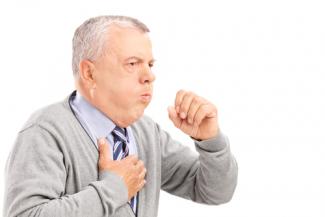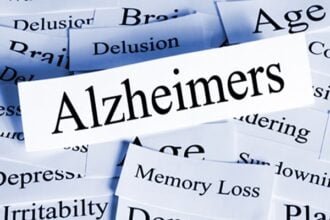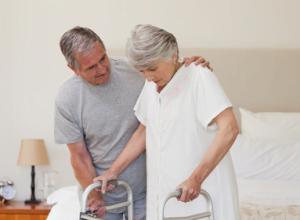 It’s been 10 years since Dad passed away, but Mom still seems to feel down every day. She’s stopped meeting friends for brunch and her once vibrant personality is fading. She has not been for a haircut in months.
It’s been 10 years since Dad passed away, but Mom still seems to feel down every day. She’s stopped meeting friends for brunch and her once vibrant personality is fading. She has not been for a haircut in months.
 It’s been 10 years since Dad passed away, but Mom still seems to feel down every day. She’s stopped meeting friends for brunch and her once vibrant personality is fading. She has not been for a haircut in months. You’re worried she’s not keeping up with the housework either; she can’t even muster the energy to straighten up a stack of papers. You wonder: when will she get out of this rut?
It’s been 10 years since Dad passed away, but Mom still seems to feel down every day. She’s stopped meeting friends for brunch and her once vibrant personality is fading. She has not been for a haircut in months. You’re worried she’s not keeping up with the housework either; she can’t even muster the energy to straighten up a stack of papers. You wonder: when will she get out of this rut?
Everyone feels down in the dumps every now and then. Life is full of ups and down. But depression is not the same as ordinary sadness. When someone no longer takes pleasure in enjoyable activities, it may signal a more serious problem.
Clinical depression is a serious, but treatable, mood disorder that affects how an older person thinks and feels. Aging is accompanied by many major life changes, making depression an all too common phenomenon. The condition affects more than 6.5 million of the 35 million Americans aged 65 years or older .
When left untreated, depression can have fatal consequences, increasing a person’s risk for medical illness, cognitive decline, and premature death. Tragically, depression is the single most significant risk factor for suicide among older adults. While those age 65 and over comprise only 13% of the U.S. population, they account for 20% of all suicide deaths . Many of those people who go on to die by suicide have reached out for help—70% visit their physician in the month they die. Yet depression is frequently missed by healthcare providers and personal contacts alike.
Lack of detection is a main problem contributing to increasing rates of depression in older adults. Many think the condition is merely a normal reaction to getting older. While chronic illness, grief, and disability may contribute to feelings of vulnerability, depression is much more profound and pervasive.
Due to the stigma surrounding mental health, many older adults are uncomfortable talking about depression. They fear their symptoms will be perceived as a character flaw, a weakness; and instead blame themselves. To avoid humiliation, they seek treatment for physical ailments only or are too ashamed to get help altogether.
As a caregiver, it’s important to recognize the symptoms of depression, so that you can address the problem even if the person is struggling to speak up. By educating yourself, you will learn about the illness and know how it is treated.
Signs and symptoms of depression in the elderly:
Here are some of the behaviors most commonly associated with depression in older adults.
Warning signs include:
- Depressed mood most of the day, nearly every day
- Long-lasting lack of interest or pleasure in activities one normally enjoys such as socializing or hobbies
- Social withdrawal or isolation (reluctance to be with friends, engage in activities, or leave home)
- Diminished appetite or overeating, often leading to weight loss or weight gain
- Difficulty sleeping, such as insomnia, or oversleeping
- Fatigue and/or low energy;
- Slowed speech
- Lack of motivation
- Poor self-esteem
- Feelings of worthlessness, self-loathing, emptiness
- Excessive and/or inappropriate guilt
- Crying too often and too much
- Difficulty concentrating or making decisions
- Feelings of hopelessness or helplessness
- Neglecting personal care (skipping meals, forgetting meds, neglecting personal hygiene)
- Unexplained aches and pains that don’t go away
- Recurrent thoughts of death or of suicide (not including fear of dying as a result of growing older)
Tips for helping a depressed elderly friend or relative:
There’s good news for older adults with depression: treatment options are available. Cognitive-behavioral therapy has been proven as an effective form of psychotherapy that can help identify negative ways of thinking that contribute to depressed mood. You can also consult your doctor or pharmacists for anti-depressant options.
 Regular stimulation helps stave off isolation and loneliness that contribute to depression. Engage the person in activities you can do together like taking a daily walk, attending a cooking class, or seeing a movie. Suggest they join a local senior center.
Regular stimulation helps stave off isolation and loneliness that contribute to depression. Engage the person in activities you can do together like taking a daily walk, attending a cooking class, or seeing a movie. Suggest they join a local senior center.
Encourage the person to follow through with treatment. Depression usually recurs when treatment is stopped too soon, so help your loved one keep up with his or her treatment plan. Be gently insistent if your plans are refused.
As a family member, friend, of health care provider to an elderly person who is depressed, watch for red flags. Look for trends in their behavior over time. Is there a certain time of day that particularly triggers sadness, affects from medications, or disturbed patterns in his or her’s sleep? Listen to your loved one’s calls for help. Identifying issues early is key to accurate diagnosis and successful treatment.
Have patience. Offer compassionate, emotional support. Your loved one’s sadness is real, but you can offer a reservoir of hope.
If you suspect your loved one is thinking about suicide seek immediate professional help. Contact 911 or a suicide hotline in your area.







